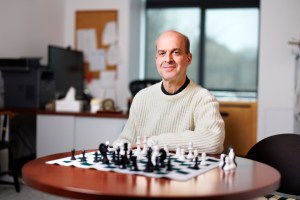Three CfA researchers share in $3 million Breakthrough Prize in Fundamental Physics
Harvard researchers Robert Kirshner, Christopher Stubbs, and Peter Challis have been named co-recipients of the $3 million Breakthrough Prize in Fundamental Physics for their role in the 1998 discovery of dark energy and the accelerated expansion of the universe. This discovery fundamentally changed our understanding of the universe and resulted in a Nobel Prize in Physics for this work.
“We were astonished to find the universe was speeding up. Many wise people thought we’d find it was slowing down. This prize recognizes what a breakthrough that observation was. Nature gets the last word,” said Kirshner.
The honor is being shared between the 51 scientists who are members of the two teams that simultaneously discovered dark energy. Kirshner, Stubbs, and Challis were members of the High-z Supernova Search Team, which was led by Adam G. Riess and Brian P. Schmidt.
Eleven of the 19 members of the High-z Supernova Search Term are or previously were affiliated with Harvard University. Both Riess and Schmidt were graduate students under Robert Kirshner, and the Nobel Prize-winning discovery of dark energy grew out of the work they did as graduate students. The members of the High-z Team also shared in the Gruber Prize for Cosmology in 2007.
The second team, the Supernova Cosmology Project, was headed up by Saul Perlmutter, who studied at Harvard as an undergraduate before joining the University of California at Berkeley.
Robert Kirshner is Clowes Professor of Science at Harvard University and author of The Extravagant Universe: Exploding Stars, Dark Energy, and the Accelerating Cosmos. Christopher Stubbs is Samuel C. Moncher Professor of Physics and Astronomy at Harvard University. Peter Challis is a technical specialist and project manager at the Harvard-Smithsonian Center for Astrophysics (CfA).





